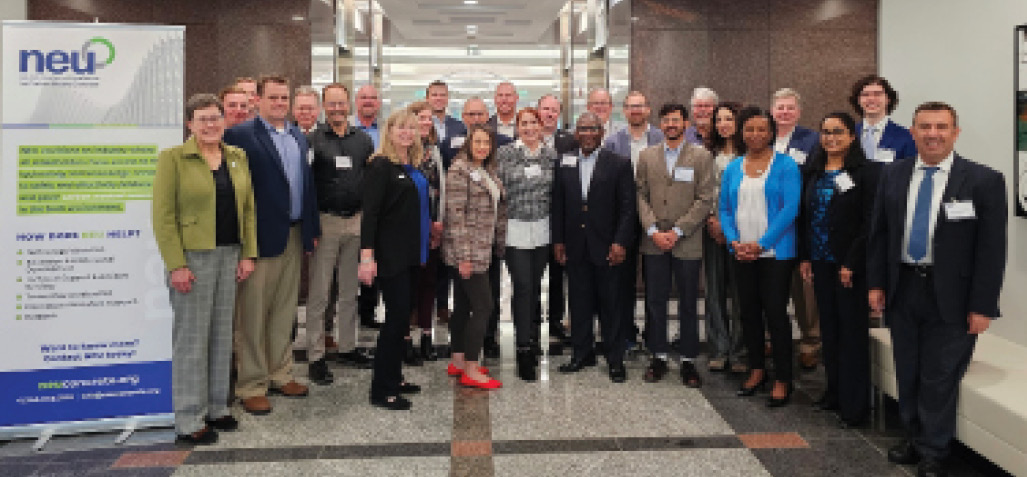
U.S. Environmental Protection Agency, Department of Energy, Federal Highway Administration and National Institute of Standards and Technology representatives offered and compiled takeaways as participants in the first Summit on Accelerating Carbon Neutral Concrete Materials and Technologies. NEU: An American Concrete Institute Center of Excellence for Carbon Neutral Concrete hosted the early-fall event to engage public and private construction stakeholders in discussion of initiatives surrounding the pursuit of cement-concrete value chain carbon neutrality by 2050.
Participants pegged knowledge of carbon dioxide emissions as a leading concern, prompting the formation of a committee to work with NEU on determining the best paths to provide education to many different constituencies—from college students and academia to architects, contractors and project owners. One proposal calls for a college curriculum geared to help those entering the industry understand CO2 emissions management.
“We realize that education and training is essential on many levels, from the concrete finisher up to the owner, as we are dealing with many new materials and technologies,” says NEU Executive Director Dean Frank, P.E. “There’s a confusing array of products on the market now and NEU has a responsibility to provide an educated background on the options.” On the heels of a successful stakeholder gathering, he adds, NEU is geared to work with members, allied organizations and federal agency representatives to help the industry understand and reach emissions reduction goals.
Along with education and outreach priorities, summit participants learned about prospective agency support through Infrastructure Investment and Jobs Act and the Inflation Reduction Act low carbon program funding or grants. With the opportunity to speak to EPA, Energy, FHWA and NIST representatives one-on-one, NEU members were able to understand what federal agencies doing now and how their initiatives can help.
CENTER FOR PRODUCTIVITY ENLISTS CHARTER MEMBERS
Ceco Concrete Construction LLC and The Conco Companies are the charter members of PRO: An ACI Center of Excellence for Advancing Productivity, both joining at Silver level ($25,000/year). Founded in 1912 and based in Kansas City, Mo., Ceco Concrete has 19 locations across the country and is widely recognized for its cast-in-place method expertise. Conco Cos. dates to 1959 and, from a San Francisco Bay Area base, offers C-I-P concrete, shotcrete and rebar installation services across a broad West Coast swath.
“PRO’s early members are long established, highly successful, well respected contractors with strong histories of design assist collaboration,” says Executive Director Phil Diekemper. “PRO will seek to highlight their success stories as models for improving productivity while adding value to projects and their owners.”
PRO is the third American Concrete Institute Center of Excellence, following NEU: Carbon Neutral Concrete and NEx: Nonmetallic Building Materials. PRO members and staff aim to advance new technologies and processes that improve concrete construction productivity beyond historic levels. — www.concreteproductivity.org
TRAFFIC CLIMBS, TRUCKING COSTS SOAR
A new American Transportation Research Institute study shows traffic congestion adding $94.6 billion in 2021 to trucking industry costs. The latest Cost of Congestion study utilizes ATRI’s unique truck GPS database to calculate trucking delay impacts from 2017 through 2021 on major U.S. roadways. While year-over-year decreased in 2020 due to the Covid-19 pandemic, congestion costs rose sharply the following year, pushing lost productivity attributable to traffic tie ups toward 1.3 billion hours—equating to more than 460,000 commercial vehicle drivers sitting idle for one year. ATRI’s analysis also found that the trucking industry wasted over 6.7 billion gallons, or $22 billion-plus, of diesel in 2021 due to congestion.
“Over the last several years, our industry has experienced some of the most dramatic increases in operating costs, including fuel, labor and equipment,” says Boyle Transportation Vice President of EHS and Quality Michael Lasko. “Imagine how those costs are magnified by sitting still in traffic. We all should keep in mind that those costs are passed down directly to consumers resulting in higher prices for goods and services throughout the economy. Hopefully we can leverage the new infrastructure spending to get our supply chains moving again.”The study is posted at www.truckingresearch.org.